
Referential and Reviewed International Scientific-Analytical Journal of Ivane Javakhishvili Tbilisi State University, Faculty of Economics and Business

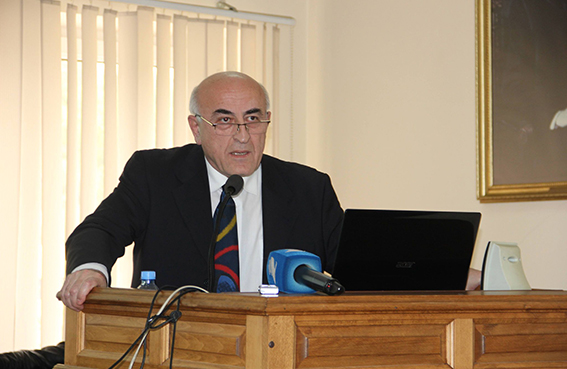
Professor Avtandil Silagadze, Academician of the Georgian National Academy of Sciences and Head of the Department of International Economics and History of Economic Thought at Ivane Javakhishvili Tbilisi State University’s Faculty of Economics and Business, has received the Filipe Gogichaishvili Prize for Outstanding Scientists.
This distinguished recognition was awarded by the Georgian National Academy of Sciences in honor of Professor Silagadze’s acclaimed scholarly cycle, At the Sources of Economic Doctrines.
Journal editorial office
2025-11-07
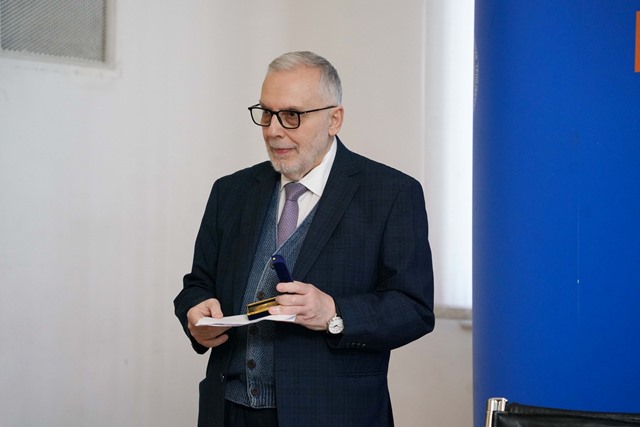
Editors: E. Mekvabishvili, G. Bedianashvili. Economic Science and the Economy of Georgia. Publisher: Universali, 2025. Length: 490 pages
On October 28, 2025, Ivane Javakhishvili Auditorium at TSU Building I hosted the presentation of the book Economic Science and the Economy of Georgia, published in honor of the 70th anniversary of Professor Vladimir (Lado) Papava – Doctor of Economic Sciences and Academician of the Georgian National Academy of Sciences.
The event was chaired by Professor Giorgi Ghaganidze, Dean of the Faculty of Economics and Business. The welcoming address was delivered by University Rector, Academician Jaba Samushia, who highlighted Professor Papava’s prolific and impactful career, noting his authorship of over 500 scholarly works published in multiple languages. The Rector emphasized the book’s high scientific and practical value, and commended Professor Papava’s tireless dedication to advancing economic science in Georgia.
On behalf of the Academic Council, Rector Samushia extended heartfelt congratulations to Professor Papava on his milestone anniversary, expressed gratitude to the editorial team for their contribution to this important publication, and awarded Academician Papava the Filipe Gogichaishvili Medal in recognition of his outstanding contribution to the development of Georgian economic science.
The scientific editors of the book, Professors Elguja Mekvabishvili and Givi Bedianashvili, addressed the audience during the event. In their remarks, they highlighted Academician Vladimer Papava’s substantial contributions to the advancement of economic science, including the development of novel theoretical directions and conceptual frameworks. They extended warm wishes to the honoree for continued creative success and expressed sincere appreciation to the contributing authors for their collaboration in shaping the publication.
Concluding the event, Academician Vladimer Papava conveyed his heartfelt thanks to University Rector, Academician Jaba Samushia; Dean of the Faculty of Economics and Business, Professor Giorgi Ghaganidze; and, in particular, to the authors of the scholarly articles and the editors of the book for their dedication and support.
The publication was made possible through the support of the Grigol Robakidze University Scientific Research and Creative Initiative Development Fund.
2025-11-07

Following the Soviet Union’s dissolution in the early 1990s, Georgia faced a multifaceted array of challenges. The country grappled simultaneously with civil unrest, territorial conflicts, and the monumental task of overhauling of its economic system. Transitioning from a centrally planned economy to one grounded in market principles unfolded amid intense political turbulence and deep social upheaval.
Georgia’s economic transformation in the early 1990s was characterized by a sharp contraction in gross domestic product, rampant hyperinflation, prolonged industrial stagnation, and alarmingly high unemployment rates. This period of intense crisis eventually gave way to gradual stabilization and structural reform. Pivotal initiatives during this transition included the privatization of state-owned enterprises, modernization of the financial sector, comprehensive tax system restructuring, and the liberalization of trade policies.
Two distinctive phenomena emerged during Georgia’s post-Soviet transformation: “necroeconomics”, referring to the survival of uncompetitive enterprises sustained solely by state subsidies, and “retroeconomics”, describing sectors that lagged markedly behind global technological standards.
Meanwhile, at the global level, the contemporary world economy faces challenges of unprecedented scale and complexity. The 2008-2009 global financial crisis exposed deep-seated structural flaws within the international financial system, inaugurating a new era of multidimensional economic pressures. The COVID-19 pandemic dealt a severe blow to global economic activity, while the ongoing economic repercussions of the Russia–Ukraine conflict have further intensified existing vulnerabilities.
Contemporary economic challenges are increasingly complex, marked by disruptions in global supply chains, escalating concerns over energy and food security, intensifying inflationary pressures, and the intricate consequences of economic sanctions on international trade and financial systems. Compounding these issues is the emergence of the so-called "zombie economy", in which financially unsustainable enterprises survive on continued external support. Structural shifts – including the redefinition of globalization, the rapid expansion of the digital economy, the mounting impact of climate change, and deepening economic inequality - further underscore the urgency and breadth of today’s economic landscape.
In this context, Academician Vladimir Papava’s monograph, From Retroeconomics to Sanctionnomics: Essays on Unconventional Economics, stands as a notable contribution to contemporary economic discourse. Offering a timely and comprehensive exploration of the challenges facing modern economic science, the work skillfully synthesizes the author’s extensive scholarly research with his practical experience, presenting a distinctive perspective that transcends conventional theoretical paradigms.
Academician Vladimir Papava’s distinguished background – as both a former Minister of Economy of Georgia and a Professor at Ivane Javakhishvili Tbilisi State University – lends considerable weight to this work. His blend of theoretical acumen and hands-on experience proves invaluable in navigating the complexities of post-communist transformation, ransitional economies, and broader global economic challenges.
Far more than a mere compilation of essays, From Retroeconomics to Sanctionnomics presents a unified and original theoretical framework that resonates with the realities of economic phenomena, positioning this monograph as a vital reference for academics, policymakers, and students seeking fresh insight beyond the bounds of conventional economic thought.
The monograph centers on the dynamics of economic transformation, a subject of critical importance for countries navigating ransitional economies. Through the introduction of innovative concepts and terminology – such as necroeconomics, retroeconomics, sanctionnomics, and coronomics – the author offers more than abstract theories; these constructs double as practical analytical tools for addressing pressing economic issues in the real world.
What distinguishes this work is its ability to bridge the often-wide gap between theoretical inquiry and applied economic policy. With astute analysis, the author engages with key challenges facing the global economy today – from the lingering effects of the 2008–2009 financial crisis to the fallout of the COVID-19 pandemic and the profound economic repercussions of the Russia–Ukraine war. As such, the monograph stands out as especially timely and relevant in today’s shifting the current geopolitical context landscape.
The author employs an interdisciplinary methodological approach framework, integrating insights from economic theory, historical inquiry, political science, and institutional economics. Unafraid to challenge conventional wisdom, he critically reexamines orthodox economic paradigms and proposes alternative perspectives that more faithfully reflect the complexities of actual economic processes –particularly in post-communist and developing contexts.
A distinctive feature of the monograph is its focus on economic phenomena that are often marginalized within mainstream economic discourse. These include economically “dead” sectors that survive solely through state subsidies, as well as the profound impact of geopolitical dynamics on global economic processes. Notably, the work is anchored in a rich empirical foundation, drawing on case studies from Eastern Europe and the former Soviet Union. These real-world examples bring tangible depth to the author’s theoretical constructs, making the synthesis of theoretical detail and conceptual innovation one of the monograph’s key strengths.
Structurally, the monograph comprises fourteen thematically interconnected essays, framed by introductory and concluding chapters. This format provides a clear and systematic progression of the author’s argument, allowing readers to follow the development of key ideas with coherence and precision. The introductory chapter outlines the concept of “unconventional economics” and underscores the urgency of its scholarly examination. Each subsequent essay addresses a distinct economic theory or phenomenon, transitioning fluidity from foundational discussions to detailed case analyses, ultimately forming a unified theoretical framework.
Among the original economic concepts introduced, necroeconomics stands out as a major contribution to the discipline. This framework analyzes economically “dead” sectors - industries that persist despite producing uncompetitive goods and surviving solely through artificial financial inflows such as subsidies or budgetary injections. These sectors are unsustainable under authentic market conditions. The author traces the emergence of necroeconomics within post-communist economies, revealing how remnants of the command economy have perpetuated inefficiencies. Rather than merely diagnosing these systemic flaws, the author explores their root causes and ramifications, and – crucially, proposes viable solutions.
Closely aligned with the concept of necroeconomics is the idea of retroeconomics, which describes the reliance of nations on outdated technologies and practices that fall markedly behind global standards. The author\'s analysis illustrates how countries may become trapped in technological stagnation – a cycle that perpetuates itself over time. He emphasizes the increasing marginal costs associated with technological innovation, which further complicate efforts toward economic modernization and expose developing economies to the risks of persistent underdevelopment.
Equally significanct is the concept of sanctionnomics, another original contribution by Academician V. Papava. This framework explores the mechanisms and consequences of economic sanctions within a geopolitical landscape where sanctions serve as common instruments of international policy. The author reveals that, beyond impacting the targeted nation, sanctions often produce far-reaching, unintended consequences – disrupting third-party economies and, in some cases, the global economic system itself His proposed typology of sanctions, coupled with a critical evaluation of their real-world effectiveness, equips scholars and policymakers with essential tools for analyzing the complexities of modern economic diplomacy.
Another foundational concept explored in the monograph is the zombie economy, which characterizes situations where insolvent firms persist due to sustained government intervention or inadequacies within the banking sector. This phenomenon locks significant resources into economically unproductive activities, thereby undermining overall efficiency and impeding healthy economic growth. The author critically assesses the adverse effects of zombie firms on productivity and resource allocation, while carefully Notably, he distinguishing the zombie economy from necroeconomics – a distinction that enriches the analytical depth of his work and highlights the nuanced interplay between overlapping yet distinct economic conditions.
The monograph’s contemporary relevance is further amplified through the author’s exploration of the economic implications of the COVID-19 pandemic, termed coronomics. Academician Papava offers a systematic and original analysis of the pandemic as an atypical economic shock – one that diverges markedly from traditional financial or cyclical crises. This conceptual framework facilitates a deeper understanding and nontraditional disruptions and their unique dynamics. The author also provides a rigorous evaluation of government response strategies, offering valuable insight into their effectiveness in countering the pandemic’s economic fallout and guiding policymakers through uncertain terrain.
One of the monograph’s defining strengths lies in its methodological departure from conventional economic analysis. Papava adopts a multidisciplinary approach that weaves together economic theory, historical inquiry, institutional analysis, and sociopolitical context. This expansive framework allows the author to transcend purely economic models and to examine economic processes as they unfold within the broader societal and political structures. Such an integrative lens is particularly well-suited for analyzing transition economies, where economic transformation is often inextricably linked to deeply interwoven with socio upheaval.
The work’s empirical depth constitutes another notable advantage. Grounded in diverse data drawn from post-communist transition economies – including illustrative case studies from Central and Eastern Europe and the former Soviet republics – Papava anchors his theoretical insights in tangible, real-world examples. These cases not only elucidate the concepts under discussion but also reinforce the credibility and practical relevance of his arguments. Through this synthesis of empirical rigor and theoretical innovation, readers gain a vivid understanding of how unconventional economic mechanisms operate in practice.
The monograph also presents a series of actionable recommendations tailored to policymakers. In the domain of monetary policy, the author offers a critical evaluation of the shortcomings inherent in traditional inflation targeting, proposing alternative metrics better suited to the unique conditions of transition economies. This insight carries particular relevance for central banks in developing countries, which frequently operate under atypical economic environment where standard tools prove insufficient.
In terms of structural reform, the author delineates strategies aimed at resolving challenges associated with necroeconomics and zombie economies, promoting technological advancement, and strengthening institutional frameworks. These proposals are firmly rooted in a rigorous diagnosis of the underlying causes and systemic obstacles that hinder effective resolution. The author\'s substantial hands-on experience in economic governance further reinforces the credibility and pragmatic utility of these proposals recommendations.
Academician Vladimir Papava’s monograph, From Retroeconomics to Sanctionnomics, stands as a major contribution to the canon of contemporary economic thought. It introduces an innovative conceptual framework for interpreting multifaceted economic phenomena, anchored in the development of original terminology and theoretical constructs. The work’s strength lies in its conceptual boldness – the formulation of fresh analytical categories; its interdisciplinary breadth – merging economic, political, and social perspectives; its practical relevance – offering targeted, actionable solutions to pressing economic issues; and its global scope – providing nuanced insight into both national and international economic dynamics.
This monograph warrants broad recognition, not only within domestic and international scholarly circles but also among policymakers and practitioners working on post-communist transformation, economic development, and global economic governance. Academician Papava’s contribution equips readers with original analytical tools for interpreting today’s multifaceted economic challenges – many of which lie beyond the grasp traditional economic theory.
Davit Sikharulidze
Associate Professor of Ivane Javakhishvili Tbilisi State University
Mr. Vladimir Papava (2024). Professor of Economics, Academician-Secretary of the Georgian National Academy of Sciences, published a monograph “FROM RETROECONOMICS TO SANCTIONOMICS: ESSAYS ON UNCONVENTIONAL ECONOMICS.” (Publishing House “iUniverse”, Editor - DANI RODRIK, Professor of International Political Economy, Harvard\'s John F. Kennedy School of Government, Harvard University, President of the International Economic Association, USA. 336 pages)
2025-07-27

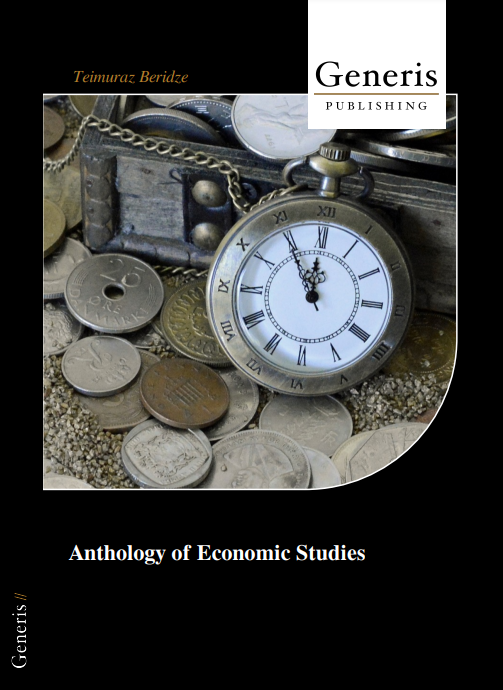
Recently, the monograph "Anthology of Economic Studies" (436 pages) by Teimuraz Beridze, Doctor of Economic Sciences, Professor of Tbilisi State University, translated by Teimuraz Nakashidze, edited by Doctor of Economic Sciences, Professor Elguja Mekvabishvili, was published in English.
The work was published by the well-known publishing house Generis Publishing, whose printed products are distributed practically all over the world, through the networks of such large companies as Amazon markets, Octavia Books, Walmart, Wellesley Books, etc.
The work introduces the reader to the features of the transitional period of the modern Georgian economy based on the principles of the market economy after gaining independence, the contents and difficulties of the implemented reforms, the ways of overcoming the problems and the achieved results.
The monograph discusses at a high academic level such issues as the essence of economic growth, investment ability and opportunity and factors affecting it, the demand and supply situation of qualified labor force and the role of specialists with professional education in its regulation, as well as economic and legal aspects of property in Georgia in the transitional period. The author\'s views, conclusions and recommendations on the model of development of the Georgian economy in the conditions of globalization deserve special attention, taking into account common regularities and national specifics.
It can be said unequivocally that the monograph for English-speaking readers has not only cognitive, but also applied value. - It gives them a clear idea, on the one hand, about the current situation, problems and challenges in the Georgian economy, on the other hand, about the ways of overcoming the problems "seen from the inside", their theoretical generalization and recommendations.
The monograph by Professor Teimuraz Beridze, saturated with the latest and rich statistical material, will provide a great service to a wide circle of readers interested in the economy of Georgia outside our country - both scientists and businessmen and investors, will help them get to know the economy of Georgia better and take bold steps to establish closer academic and business relations with
Professor Ioseb Archvadze
2024.
2024-07-16

Academician of the National Academy of Sciences of Georgia, Professor of Ivane Javakhishvili Tbilisi State University - Vladimir Papava was elected a full member of the International CORE Academy of Sciences and Humanities, for his special contribution to macroeconomics and applied economics.
We congratulate Mr. Vladimir on another international recognition and wish him further scientific success.
https://www.coreacad.org/Member.aspx?ProId=116
Editorial Board of the Journal “Economics and Business“
2024-03-25

„Eternal Georgian Village".
Recently (2024) "Meridian" publishing house published the monograph (260 pp.) "Eternal Georgian Village".
Authors:
Paata Koghuashvili - Doctor of Economic Sciences, Professor of the Technical University of Georgia, Academician of the Academy of Agricultural Sciences.
Ioseb Archvadze - Doctor of Economics, Professor of Kutaisi University.
Givi Talakvadze - Doctor of Physical and Mathematical Sciences, full member of the International and Georgian Engineering Academies and the Georgian Academy of Natural Sciences, Head of the Applied Analytics and Forecasting Center of the Technical University of Georgia.
Editors: - Vladimir Papava - Academician, Nodar Chitanava - Academician of the Academy of Agricultural Sciences of Georgia.
The monograph is dedicated to the economic, social, demographic and everyday problems of the modern Georgian village, ways of overcoming them, the main aspects of the country\'s security related to the state of the sector.
The monograph will provide a great service to a wide circle of readers interested in agrarian issues, modern Georgian rural situation and, first of all, it is intended for government officials, specialists and researchers - who are institutionally responsible for leading the Georgian rural, agrarian sector, national economy as a whole and developing effective economic policy.
Editor of the Journal "Economy and Business"
08.04.2024
2024-04-08

Academician of the National Academy Sciences of Georgia, Professor Avtandil Silagadze, was awarded the Ivane Javakhishvili Medal for his fruitful scientific and university-pedagogical work, by the decision of the Academic Council of Tbilisi State University named after Ivane Javakhishvili.
The editorial board and editorial team of journal "Economics and Business", congratulate academician Avtandil Silagadze on this honorable and well-deserved award and wish him further success.
2024-07-17
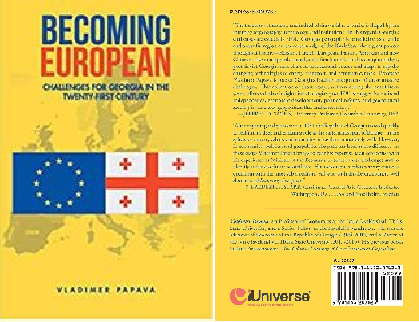
Another book - "Becoming European: Challenges for Georgia in the Twenty-First Century" by Professor Vladimer Papava has been published in USA. This book is a collection of electronic publications over the past 15 years. These articles are devoted to the political and economic problems of Post-Communist Georgia in the XXI century. For Georgia, even before the collapse of the USSR, and especially in the last years of its existence, the priority was an Euro-Atlantic orientation. Georgia\'s European path of development has not been an easy one. The formation of an European state in Post-Communist Georgia is associated with many difficult tasks, which solution is of paramount importance for the future of this country. On June 27, 2014, the EU-Georgia Association Agreement was signed in Brussels. The agreement opened up new opportunities for Georgia to integrate into the EU. At the same time, Georgia still needs to do a lot of work for a real rapprochement with the EU and this will require many years of hard work.
Leading world professors and politologs have expressed their high appreciation for the book. Between them are:
— Jeffrey D. Sachs, University Professor, Columbia University, USA;
— S. Frederick Starr, Chairman, Central Asia-Caucasus Institute, Washington, D.C., USA and Stockholm, Sweden;
— Anders Åslund, Senior Fellow, Atlantic Council, and Adjunct Professor, Georgetown University, USA;
— Keith W. Crane, Senior Fellow, Science and Technology Policy Institute, Washington, DC, USA;
— Paul Goble, Former Special Advisor on Soviet Nationalities at the US Department of State, and Adjunct Professor, Institute of World Politics, USA;
— Paul Hare, Professor Emeritus, Heriot-Watt University, Edinburgh, Scotland, UK;
— Stephen F. Jones, Professor, Russian and Eurasian Studies/International Relations, Mount Holyoke College, USA;
— Neil Macfarlane, Professor of Oxford University, Oxford, UK;
— Thomas W. Simons, Jr., former U.S. Ambassador to Poland and Pakistan, Visiting Scholar, Davis Center for Russian and Eurasian Studies, Harvard University, USA;
— Ben Slay, Senior Economist, UNDP Regional Bureau for Europe and CIS.
The book can be viewed and purchased on the Amazon platform:
https://www.amazon.com/gp/product/1663207623ref=em_1p_0_im&ref_=pe_2313400_565753830
2021-01-23
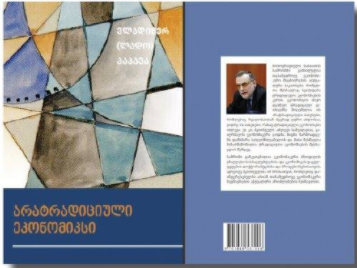
Recently, Academician of Georgian National Academy of Sciences, Professor Vladimer Papava\'s new monograph "Unconventional Economics" was published. Feedback on the paper can be found at the link
This work gives to economists a basis for an adequate understanding of different economic realities. For future scientists, doctoral students, the monograph will undoubtedly help in a new understanding and research of the difficulties of economic science. We would like to congratulate the economic community with a monograph of global scientific significance. Congratulations to author, our colleague and friend, we wish him further creative success.
http://www.papava.info/publications/New_Unconventional_Vision_of_Economics-Vladimir-Lado-Papava.pdf
2020-09-07

November 10 is World Science Day established by UNESCO. In this regard, the Georgian National Academy of Sciences awarded members of the editorial board of the magazine "Economics and Business", Professors Ramaz Abesadze, Elguja Mekvabishvili and Mikheil Jibuti with honorary diplomas for scientific achievements in the field of economics. We congratulate the scientists on the honorary award and wish them further success in their work
2020-10-10
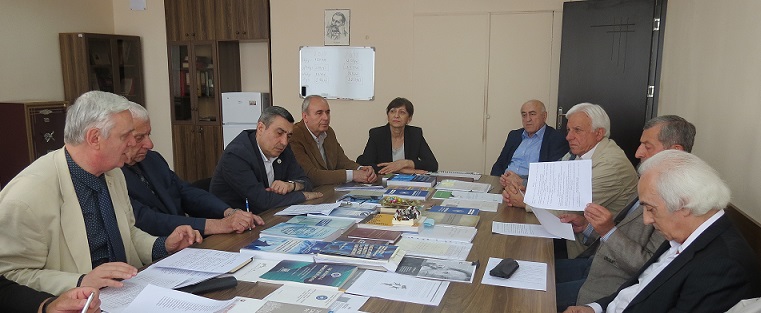
Editorial board meeting on March 3, 2019.On May 21, 2019, another meeting of the editorial board of "Economics and Business" journal was held, at which the journal board discussed and approved the content of journal N2 of 2019. The reviewers presented their findings regarding the articles. A separate note was made regarding some works. Overall, the articles presented in the journal are appreciated and recommended for publication.
The editorial board also discussed the organizational issue. In particular, the board includes the former president of the National Bank of Georgia, currently the chairman of the Supervisory Board of Silk Road Bank (England), senior advisor and consultant of J.Stern&Co\'s investment office, academician Irakli Managadze.
2019-05-25
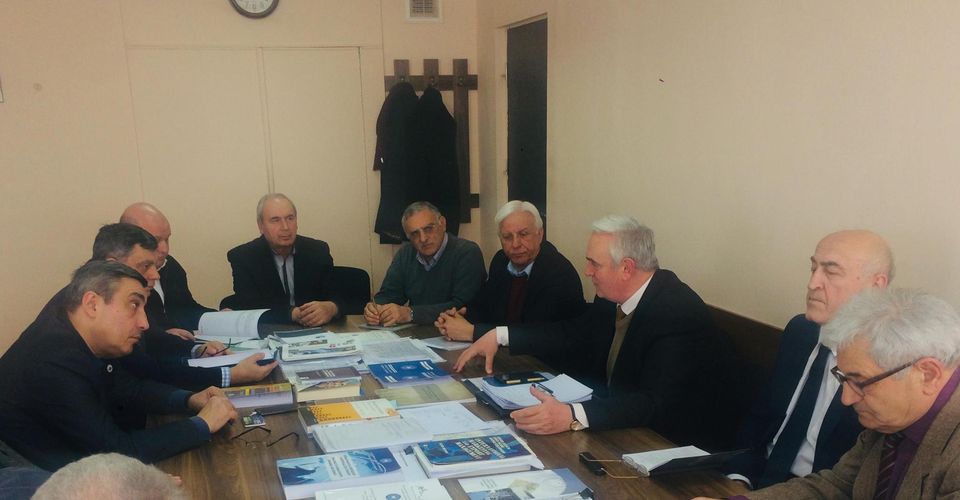
On March 3, 2019, another session of the editorial board of the "Economics and Business" magazine was held at the Faculty of Economics and Business, where a discussion was held about the introduction of the rubric of Georgian economic terminology in the magazine and the necessary format for creating an appropriate international standard for the literature used in the articles.
The members of the editorial board discussed and unanimously approved the content of the N1 issue of the magazine for 2019.
Regarding the further inclusion of the journal in international databases, the importance of increasing the number of articles published in the journal in English and attracting foreign authors more intensively was noted at the session.
2019-03-05
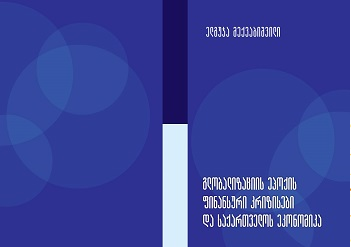
The Publishing House "Intellect" published the monograph (287 pp.) - "Financial Crises of the Era of Globalization and the Economy of Georgia". Author - Econ. Doctor of Sciences, Professor, Editor-in-chief of "Economics and Business" journal - Elguja Mekvabishvili, Editor - Econ. Doctor of Sciences, Professor Teimuraz Beridze; Reviewers - Econ. Doctor of Sciences Professor Revaz Gvelesiani, Econ. Acad. Doctor, Associate Prof. Inga Balarjishvili, Econ. Acad. Doctor, Associate Prof. Tamaz Zubiashvili.
The work was done by the Department of Theoretical Economic of Iv. Javakhishvili Tbilisi State University.
The monograph discusses the regularities of the origin and development of economic globalization, shows the contradictions characteristic of globalization, one of the main manifestations of which are regional and global financial crises. The causes and logic of development of financial crises in the countries of Latin America and East Asia region are characterized. The impact of the East Asian crisis on the banking and currency spheres of the Georgian economy is analyzed.
Special attention is paid to the study of the global financial crisis of 2007-2009. A new theoretical and methodological basis for crisis research has been developed. An important place in the book is the analysis of challenges and threats in the period of post-crisis development of the global and Georgian economy. Some measures to prevent them are suggested. The author\'s interpretation of the crisis-free development model of the economy and the study of the theoretical, methodological and practical aspects of the effective integration of Georgia into the globalized economy are original.
The work is intended for students of economics and business administration of higher institutions, professors and a wide circle of readers interested in economic issues.
2018-09-25
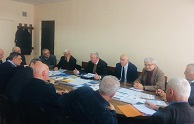
On December 6, 2018, the session of the editorial board of the journal "Economics and Business" was held at the Faculty of Economics and Business. The members of the editorial board discussed the reviews, notes of N4 articles of 2018. The board unanimously approved the contents of the N4 journal of 2018.
The board also discussed changes to the format of articles to be published. An opinion was expressed that the volume of the Summary should be increased, as this is a necessary condition for placing the journal in international databases.
2018-12-14









